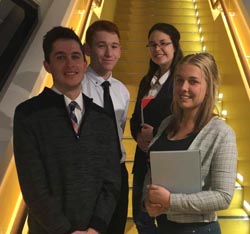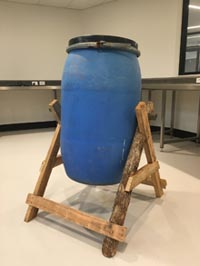 The design of a system for composting organic food waste in an
African refugee community has earned a major gong for four engineering students
at Charles Sturt University (CSU).
The design of a system for composting organic food waste in an
African refugee community has earned a major gong for four engineering students
at Charles Sturt University (CSU).
Participating for the first time in the annual national competition run by Engineers Without Borders (EWB) Australia, the Two Good to Waste team, consisting of Adrian Hickey, Lachlan Hicks, Amber Thomas and Rebecca Willcox, won best project for semester one from student groups in NSW universities for their project 'Creating a Composting Solution'.
CSU subject coordinator, Ms Andrea Goncher said there was tough competition between CSU teams and across NSW, where all projects submitted to EWB were judged by an independent review team.
"All our students developed design solutions for the EWB Challenge as part of their first-year design-based course," Ms Goncher said.
"The Challenge is a humanitarian design program embedded in the curriculum of over 8,000 first year university students at 30 universities in Australia and New Zealand to address real world, human-centred problems that also promote sustainable community development.
"This year, the EWB Challenge partnered with the United Nations High Commission for Refugees in Zambia and the Mayukwayukwa Refugee Settlement in western Zambia to develop ideas that provide cleaner drinking water and more effective sanitation for the community.
"The Charles Sturt University course uses the annual Challenge to provide teams of student engineers the opportunity to solve real world problems with human dimensions."
 Other projects by CSU students tackled developing improved
construction methods for pit latrines, interlocking mud bricks for constructing
shelters, a device to purify household water, a 'hoop house' to improve
nutritious food supply, and rainwater harvesting systems.
Other projects by CSU students tackled developing improved
construction methods for pit latrines, interlocking mud bricks for constructing
shelters, a device to purify household water, a 'hoop house' to improve
nutritious food supply, and rainwater harvesting systems.
The CSU students will be joined by the top teams from semester two at the EWB Challenge Showcase to be held in Melbourne in December this year, with the national winner to be announced at the event.
"The design solutions developed by our engineering students show the capacity of engineers to work in humanitarian contexts and the positive impact for developing countries," Ms Goncher said.
The winning student designs will be presented to EWB Australia and community partners with UNHCR Zambia to support their work in supporting refugees.





Social
Explore the world of social